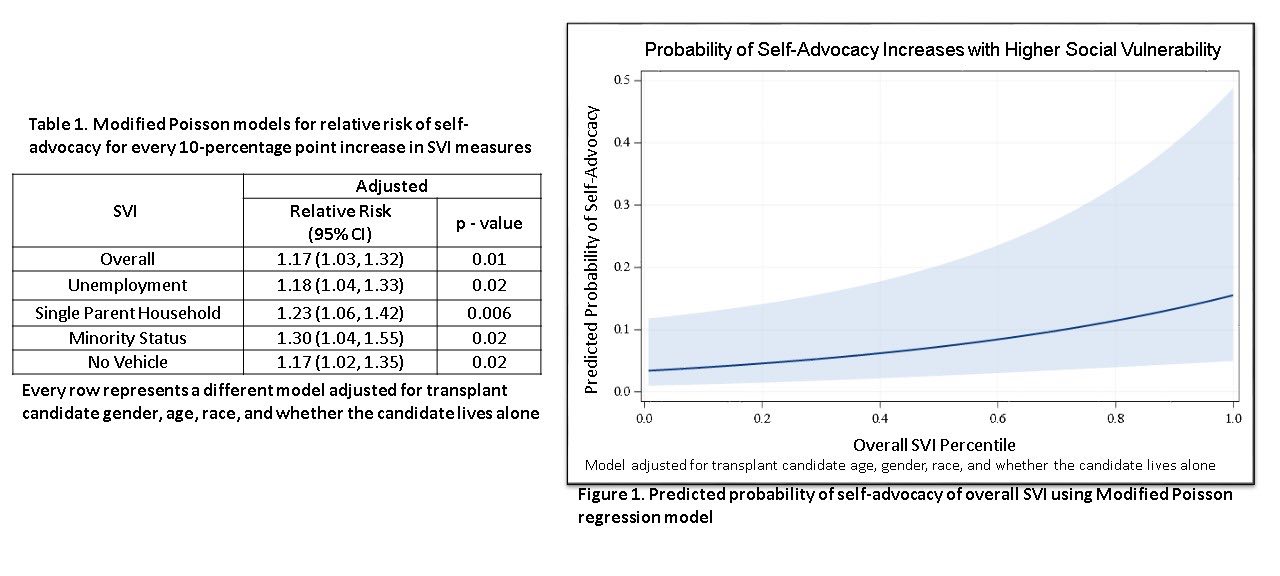Greater Social Vulnerability is Associated with Self-advocacy in the Living Donor Navigator Program
A. Carter, A. C. Kale, R. D. Reed, B. A. Shelton, H. Qu, M. C. McLeod, B. J. Orandi, R. M. Cannon, D. Anderson, P. MacLennan, V. Kumar, M. Hanaway, J. E. Locke
University of Alabama at Birmingham Hospital, Birmingham, AL
Meeting: 2021 American Transplant Congress
Abstract number: 869
Keywords: Kidney transplantation, Living donor, Multivariate analysis, Psychosocial
Topic: Clinical Science » Kidney » Kidney Psychosocial
Session Information
Session Name: Kidney Psychosocial
Session Type: Poster Abstract
Session Date & Time: None. Available on demand.
Location: Virtual
*Purpose: The Living Donor Navigator (LDN) program helps transplant candidates identify live donors by pairing them with an advocate – a friend or family member trained to speak on their behalf. Some candidates are unable to identify an independent advocate and undergo LDN advocacy training alone as self-advocates. The self-advocate phenotype mirrors that of other vulnerable populations and is associated with decreased likelihood of LDKT. The purpose of this study was to examine the association between social vulnerability and LDN self-advocacy.
*Methods: This single center, retrospective cohort study included 110 transplant candidates with Alabama residences who enrolled in the LDN program between 04/2017-06/2019. Social vulnerability measures at the census tract-level were obtained from the CDC’s Social Vulnerability Index (SVI), which is comprised of 15 social factors based on data collected from the US census. Modified Poisson regression was used to evaluate the relative risk of self-advocacy associated with social vulnerability.
*Results: Of the 110 candidates, 19% (n=21) were self-advocates. LDN participants had 17% higher risk of self-advocacy for every 10-percentage point increase in overall SVI (adjusted relative risk (aRR) 1.17, 95% Confidence Interval (CI): 1.03-1.32, p=0.01; Table 1, Figure 1). Living in areas with more unemployment (aRR: 1.18, 95%CI: 1.04-1.33, p=0.02), single parent households (aRR: 1.23, 95%CI: 1.06-1.42, p=0.006), minority status (aRR: 1.30, 95%CI: 1.04-1.55, p=0.02), or no vehicle households (aRR: 1.17, 95%CI: 1.02-1.35, p=0.02) was significantly associated with increased risk of self-advocacy (Table 1).
*Conclusions: LDN participants living in more socially vulnerable areas had increased risk of self-advocacy. Community-level vulnerability may limit transplant candidates’ ability to engage with the LDN program as designed. LDKT programs should address individual- and community-level vulnerability to create culturally competent solutions for mitigating disparities in LDKT.
To cite this abstract in AMA style:
Carter A, Kale AC, Reed RD, Shelton BA, Qu H, McLeod MC, Orandi BJ, Cannon RM, Anderson D, MacLennan P, Kumar V, Hanaway M, Locke JE. Greater Social Vulnerability is Associated with Self-advocacy in the Living Donor Navigator Program [abstract]. Am J Transplant. 2021; 21 (suppl 3). https://atcmeetingabstracts.com/abstract/greater-social-vulnerability-is-associated-with-self-advocacy-in-the-living-donor-navigator-program/. Accessed February 19, 2026.« Back to 2021 American Transplant Congress

